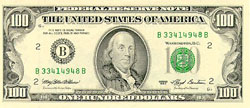Benjamin Franklin On Money
|
| updated |
Copy Link Code
|
 Of all the titles that fit on Benjamin Franklin, businessman is perhaps the least celebrated in the historical perspective. Franklin was enormously successful with his print shop and the publications it produced, including both the highly circulated Pennsylvania Gazette as well as his famous annual issue of "Poor Richard's Almanack". But the success Franklin had was not pure luck, he had a set of values that helped him lessen expenses and develop assets. His lessons on money have remained with us today in the form of sayings and financial virtues. Published by Benjamin Franklin, The Way to Wealth was an essay pulled from his "Almanack" that included wisdom and advice on money making and money saving; some of the phrases from this essay have survived in the modern American lexicon. The strongest themes in The Way to Wealth are frugality and an industrious work ethic, a Franklin legacy that became an indelible part of American culture. Franklin saw debt and laziness as the downfall of man and the attitude of procrastination to be avoided at all costs.
Of all the titles that fit on Benjamin Franklin, businessman is perhaps the least celebrated in the historical perspective. Franklin was enormously successful with his print shop and the publications it produced, including both the highly circulated Pennsylvania Gazette as well as his famous annual issue of "Poor Richard's Almanack". But the success Franklin had was not pure luck, he had a set of values that helped him lessen expenses and develop assets. His lessons on money have remained with us today in the form of sayings and financial virtues. Published by Benjamin Franklin, The Way to Wealth was an essay pulled from his "Almanack" that included wisdom and advice on money making and money saving; some of the phrases from this essay have survived in the modern American lexicon. The strongest themes in The Way to Wealth are frugality and an industrious work ethic, a Franklin legacy that became an indelible part of American culture. Franklin saw debt and laziness as the downfall of man and the attitude of procrastination to be avoided at all costs.
In the writings of Benjamin Franklin on money, he stresses the value of saving money. His most famous quotes, often twisted slightly, would include, "A penny saved is a penny earned" and "Remember that time is money." With all these aphorisms and lessons from Benjamin Franklin, Way to Wealth is still popular reading in the financial world of today. Franklin emphasized personal responsibility and hard work as the path to success; although he did believe in voluntarism and some forms of charity, he found that public support for the poor often led to dependence and did not help in the long term. He felt that those in debt were obligated to work non-stop until they could emerge into economic freedom and felt that the slashing of expenses would help to speed this process. Franklin said he would "rather go to bed with no dinner than to rise in debt." But he was also aware that the pursuit of money was not the same as the pursuit of happiness and believed that those who believed it was all about money would get lost in the never-ending chase for greater fortunes.
So why does Benjamin Franklin appear on our money if he was never the president? Well, there can be no doubting the immense contributions of Franklin to the birth of the nation and the development of American culture. At the time of the ratification of the U.S. Constitution, Franklin was its oldest signee at 81 years old. He had been an American leader and celebrity for decades. For Ben Franklin, jobs included printer, writer, scientist, inventor, postmaster, diplomat and politician. Many of the other men who would come to be known as Founding Fathers looked up to Franklin as an influential thinker and master of diplomacy. Franklin was the only man to sign all four of the crucial documents in the birth of America: the Declaration of Independence, Franco-American Alliance, Treaty of Paris and U.S. Constitution. For this, it is no doubt that he would be honored with such a widespread commemoration as the $100 bill.
